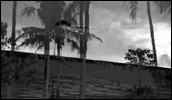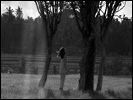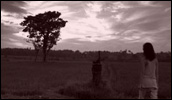Mirrored Mind
- Year
- 2004
- Original title
- Kyoshin
- Japanese title
- 鏡心
- Director
- Cast
- Running time
- 61 minutes
- Published
- 16 January 2007



by Tom Mes
There are adjectives aplenty that can be applied to Sogo Ishii: unconventional, non-conformist, iconoclastic, idiosyncratic, stubborn, tenacious. This is because the most important Japanese filmmaker of the past 30 years has spent his equally long career being all these things, and with such consistency that it can only beg unreserved admiration. Even films that began life as jobs-for-hire (Burst City, Angel Dust, Gojoe) today remain particularly and unmistakably Ishii's, including large parts of the feature-length, Nikkatsu-produced remake of Panic High School, which the director has all but disowned.
Genres, running times, collaborators, soundtracks, down to the choice of equipment; Ishii's idiosyncrasies have in many cases made him a pioneer. In some, they have made him a pariah. Sometimes both at once. Throughout it all he has hung in there and retained his belief, resulting in a body of work of great cohesion, an ongoing evolution rather than a clearly delineated oeuvre. This process is still ongoing, as his most recent film to date, Mirrored Mind, attests.
Ishii himself has called it a fresh start, likening the experience of making it to starting over from zero as a filmmaker. Indeed for the first twenty minutes or so, his fans might wonder whether they are watching an Ishii film at all. Composed of lengthy soliloquies by an alienated female Tokyoite, the early sections of Mirrored Mind tend toward the kind of arthouse navel gazing so typical of some of the post-Ishii independents, like his own former assistant Nobuhiro Suwa. Such an observation is merely skin deep, however. From the first shots of candid street scenes, the film's images communicate something far more resonant, deeper, beyond words - something that is felt instead of just seen or heard. The images of Mirrored Mind are of such striking clarity that they can justly be called luminous. To reveal that it was shot on video can only work against getting the beauty of this film across in words. What we have here is something that resembles, nay, surpasses the human eye: a hyperreality that makes you, as Ishii puts it, forget there was a camera involved in the first place.
The true beauty of these images, though, is in what they show. The film is divided into two sections. One is set in the Shibuya of concrete and steel, the quintessential Tokyo amid which an unnamed struggling actress (Ichikawa) is about to fall apart from numbness and dehumanisation. The other is the verdant, abundant nature of the island of Bali, where she eventually rediscovers the nature inside herself. If the contrast seems somewhat pedestrian, far less so is the eventual evaporation of this divergence. Beauty is not the exclusive domain of utopian travel destinations. The man-made environment contains just as much of it, but we need to be willing to open our eyes, minds, and hearts to it. The same sun that sets into a tropical sea also reflects off steel. The same rain falls on leaves and on asphalt. The same clouds pass over forests and cities. The same human beings dwell among both. Indeed, humanity is the key, the knot that ties both ends together. If man is a product of nature, then what is man-made must inevitable contain something natural inside it. Ishii captures this in the sunlight mirrored off the gleaming façade of a tower block, in the harmony of a city's (or even a living room's) combined light sources, in raindrops falling down a pane of glass. Like Kohei Oguri, who achieved a similar effect and impact in films like Sleeping Man and The Buried Forest, Ishii not only has the sharpest of eyes, but also knows where to direct them.
In the end, what at first glance seemed atypical becomes a next step in Ishii's evolution. Like the rudimentary bones and organs in our own bodies that link us to our most primordial ancestors, Mirrored Mind carries within it the remnants of what came before - of Angel Dust's contrasting of town and country, of August in the Water's plunge into man's tropical roots, of The Master of Shiatsu's meditative tone and beguiling lights, of all these three films' female-centered narratives, of Electric Dragon and Dead End Run's experiments with immersive sound, and even of Ishii's early punk works' appetite for (self-) destruction. In that sense too, this film is like a mirror, but one that works two ways: on one side it reflects what came before and on the other it projects a beacon into the as yet unwritten future.